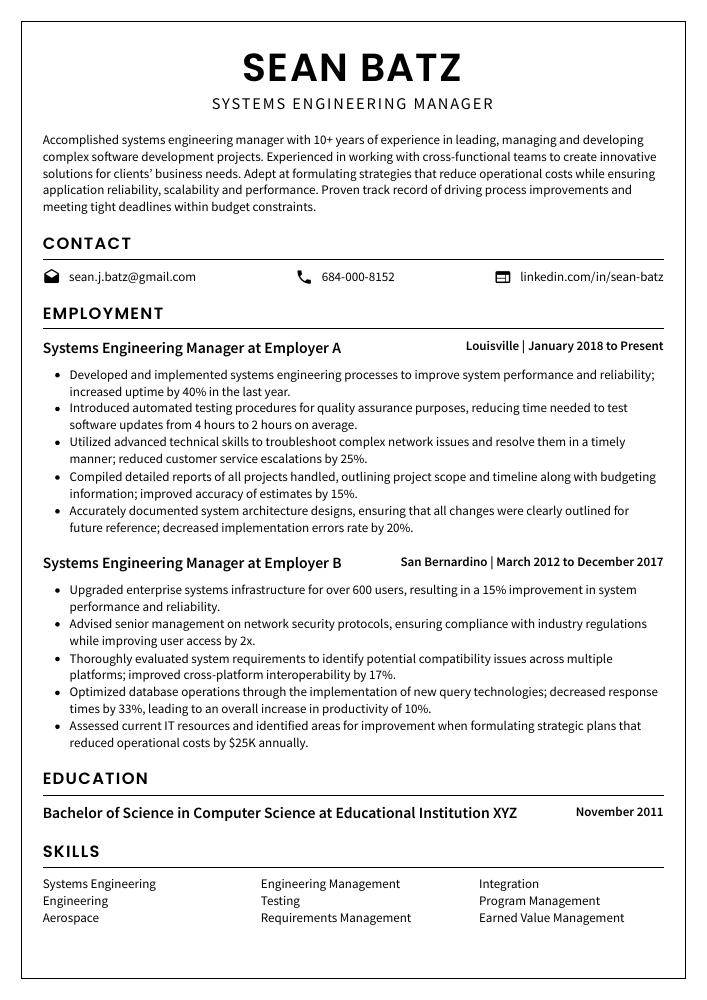Systems Engineering Manager Resume Guide
Systems Engineering Managers are responsible for overseeing the development and implementation of systems engineering projects. They collaborate with a variety of departments to ensure that all technical requirements are met, while also managing budgets and timelines. Additionally, they lead teams in troubleshooting any system issues that arise during the project’s development or maintenance cycle.
Your expertise in systems engineering is unparalleled, so you’d make a great addition to any organization. But hiring managers won’t know who you are unless they see your resume. To ensure that it stands out from the competition, take time to craft one with an eye-catching design and compelling content.
This guide will walk you through the entire process of creating a top-notch resume. We first show you a complete example and then break down what each resume section should look like.
Table of Contents
The guide is divided into sections for your convenience. You can read it from beginning to end or use the table of contents below to jump to a specific part.
Systems Engineering Manager Resume Sample
Sean Batz
Systems Engineering Manager
[email protected]
684-000-8152
linkedin.com/in/sean-batz
Summary
Accomplished systems engineering manager with 10+ years of experience in leading, managing and developing complex software development projects. Experienced in working with cross-functional teams to create innovative solutions for clients’ business needs. Adept at formulating strategies that reduce operational costs while ensuring application reliability, scalability and performance. Proven track record of driving process improvements and meeting tight deadlines within budget constraints.
Experience
Systems Engineering Manager, Employer A
Louisville, Jan 2018 – Present
- Developed and implemented systems engineering processes to improve system performance and reliability; increased uptime by 40% in the last year.
- Introduced automated testing procedures for quality assurance purposes, reducing time needed to test software updates from 4 hours to 2 hours on average.
- Utilized advanced technical skills to troubleshoot complex network issues and resolve them in a timely manner; reduced customer service escalations by 25%.
- Compiled detailed reports of all projects handled, outlining project scope and timeline along with budgeting information; improved accuracy of estimates by 15%.
- Accurately documented system architecture designs, ensuring that all changes were clearly outlined for future reference; decreased implementation errors rate by 20%.
Systems Engineering Manager, Employer B
San Bernardino, Mar 2012 – Dec 2017
- Upgraded enterprise systems infrastructure for over 600 users, resulting in a 15% improvement in system performance and reliability.
- Advised senior management on network security protocols, ensuring compliance with industry regulations while improving user access by 2x.
- Thoroughly evaluated system requirements to identify potential compatibility issues across multiple platforms; improved cross-platform interoperability by 17%.
- Optimized database operations through the implementation of new query technologies; decreased response times by 33%, leading to an overall increase in productivity of 10%.
- Assessed current IT resources and identified areas for improvement when formulating strategic plans that reduced operational costs by $25K annually.
Skills
- Systems Engineering
- Engineering Management
- Integration
- Engineering
- Testing
- Program Management
- Aerospace
- Requirements Management
- Earned Value Management
Education
Bachelor of Science in Computer Science
Educational Institution XYZ
Nov 2011
Certifications
Certified Systems Engineering Professional (CSEP)
International Council on
May 2017
1. Summary / Objective
Your resume summary should provide the hiring manager with an overview of your qualifications and experience as a systems engineering manager. In this section, you can highlight your technical expertise in areas such as system design, software development lifecycle management, project management methodology implementation, and team leadership. Additionally, you could mention any certifications or awards that demonstrate your commitment to excellence in the field.
Below are some resume summary examples:
Well-rounded systems engineering manager with 10+ years’ experience leading teams in the development, implementation and maintenance of complex software solutions. Adept at managing multiple projects while maintaining high quality standards. Proven track record of successful delivery on time and budget for clients across industries such as finance, retail, healthcare and telecoms. Experienced in developing strategies to overcome technical challenges quickly and effectively.
Enthusiastic systems engineering manager with a proven track record of success leading cross-functional teams. Experienced in the development, implementation and maintenance of complex software solutions for large organizations. Proven ability to develop strategies that improve operational efficiency and customer satisfaction while meeting organizational goals. Demonstrated leadership skills in managing projects from conception through completion on time and within budget.
Amicable and well-organized systems engineering manager with 10+ years of professional experience. Highly skilled in leading cross-functional teams to design, implement and maintain complex IT solutions for organizations. Proven track record of successful deployments that meet customer requirements on time and within budget. Seeking a position at XYZ Corporation where I can use my knowledge and expertise to help the company reach its goals.
Passionate Systems Engineering Manager with 10+ years of experience leading teams to design and implement complex solutions. Skilled in cost-effective use of resources and developing processes that improve operational efficiency. Proven success increasing customer satisfaction ratings by 15%. Seeking to bring my leadership, problem solving, and strategic planning skills to the role of Senior Systems Engineering Manager at ABC Corporation.
Professional systems engineering manager with 15+ years of experience leading teams in the development, implementation and maintenance of complex enterprise-level IT solutions. At XYZ Corporation, managed a team responsible for developing integrated system architecture that enabled their business to scale rapidly. Recognized for delivering successful projects on time and under budget while ensuring high levels of customer satisfaction.
Talented and experienced systems engineering manager with 7+ years of experience leading teams in the design, development, and implementation of complex software projects. Proven ability to manage large-scale initiatives while retaining a focus on customer service excellence. Seeking an opportunity at ABC Tech to use strong organizational skills and technical acumen to oversee system architecture solutions for its global customers.
Diligent and analytical systems engineering manager with 8+ years of experience leading teams to successfully develop, deploy, maintain, and upgrade complex software solutions. Proven track record of identifying areas for improvement in the development process. Seeking a position at ABC Tech where I can leverage my knowledge in system design and architecture to lead high-performing teams while driving innovative projects forward.
Hard-working and results-oriented systems engineering manager with 8+ years of experience leading complex projects for various industries. Skilled in developing and implementing strategies, processes, tools, and technologies to drive organizational efficiency. Looking to bring my expertise in meeting tight deadlines while maintaining top quality standards to ABC Tech’s exciting portfolio of clients.
2. Experience / Employment
The work history/experience section should be written in reverse chronological order, meaning your most recent role is listed first.
When writing this section, you want to provide detail on what you did and the results achieved. Stick to bullet points primarily; doing so allows for easy digestion of the information by the reader.
For example, instead of saying “Managed a team of engineers,” you could say, “Led a team of 10 software engineers responsible for developing new features and resolving bugs within an agile environment; improved product quality by 30% while reducing development time by 25%. ”.
To write effective bullet points, begin with a strong verb or adverb. Industry specific verbs to use are:
- Managed
- Designed
- Implemented
- Monitored
- Optimized
- Administered
- Developed
- Tested
- Troubleshot
- Documented
- Automated
- Analyzed
- Resolved
- Upgraded
- Configured
Other general verbs you can use are:
- Achieved
- Advised
- Assessed
- Compiled
- Coordinated
- Demonstrated
- Expedited
- Facilitated
- Formulated
- Improved
- Introduced
- Mentored
- Participated
- Prepared
- Presented
- Reduced
- Reorganized
- Represented
- Revised
- Spearheaded
- Streamlined
- Structured
- Utilized
Below are some example bullet points:
- Monitored and managed a team of 10+ systems engineers, ensuring that all projects were completed on time and within budget; reduced production costs by 17%.
- Participated in the development of new software programs to improve efficiency & accuracy while troubleshooting existing issues with system design & performance; increased user satisfaction ratings by 15% over six months.
- Automated daily testing procedures for hardware components and application updates, significantly reducing manual QA efforts and increasing overall cycle times by 45%.
- Reliably maintained the integrity of all customer data stored across multiple servers while meeting industry-standard security protocols; minimized hacking attempts and potential breaches by 24%.
- Tested, evaluated and deployed new technologies to enhance network capabilities as well as optimize resource utilization; improved uptime reliability from 75% to 95% during tenure at company.
- Resourcefully managed a team of 10+ systems engineers to develop, test and implement IT solutions for large-scale projects; improved system performance by 32% and reduced downtime hours by 40%.
- Improved existing software architecture design processes through continuous testing, debugging and code refactoring with the help of automation tools.
- Presented innovative ideas in weekly meetings that provided cost savings of over $10 million on various infrastructure projects within 1 year.
- Resolved key technical issues related to software integration, database management & networking security quickly and efficiently while overseeing all system engineering activities across multiple teams simultaneously.
- Spearheaded the successful launch of 3 new cloud applications which increased customer satisfaction levels by 15%.
- Mentored and trained a team of 10 systems engineers, resulting in a 30% improvement in technical proficiency.
- Reorganized the engineering department to include better defined roles and responsibilities; reduced redundancy by 56%.
- Efficiently managed 7+ software projects simultaneously with an average completion rate of 4 days ahead of schedule.
- Represented the company at various national industry events, delivering insightful presentations on best practices related to system architecture & design that generated $20K worth of new business opportunities within 3 months after each event attended.
- Implemented advanced automation technology solutions across multiple platforms that increased productivity by 35%, decreased annual costs by 20%, and improved customer experience ratings from 79% to 92%.
- Designed and implemented a comprehensive IT infrastructure for 10+ departments, leading to a 25% increase in system performance and uptime.
- Troubleshot complex technical issues related to hardware/software systems and networks; resolved 50+ technical incidents within an average of 2 hours each.
- Demonstrated superior project management skills by successfully overseeing the development & deployment of 5 applications on-time and under budget while managing 6 engineers across 3 teams.
- Achieved dramatic improvements in customer satisfaction ratings due to seamless integration of new services into existing network architecture; improved scores from 68% to 94%.
- Substantially decreased operating costs through efficient utilization of resources, resulting in $450K savings over the course of one year alone.
- Managed a team of 10+ Systems Engineers, designing and implementing IT systems architectures to meet organizational needs while ensuring compliance with industry standards.
- Coordinated the development process of software applications, hardware-software integration projects and other engineering initiatives; delivered projects on time and within budget by 20%.
- Prepared technical documentation related to system design specifications, server configurations and security protocols for internal use as well as customer review purposes; improved overall efficiency by 30%.
- Analyzed system performance data such as throughput rates & resource utilization levels in order to identify areas needing optimization or improvement; identified potential issues before they became a problem resulting in fewer service outages over the year (+25%).
- Actively monitored emerging technologies & best practices pertaining to cyber security measures and implemented them across all platforms within two weeks of release for enhanced protection against external threats (-50% vulnerability rate).
- Formulated strategies for the implementation of 7 new IT systems, resulting in a 26% decrease in system downtime and an 8% increase in user satisfaction.
- Streamlined engineering processes to improve service delivery by over 23%; reduced troubleshooting time from 6 hours to 2 on average per incident.
- Competently managed 14 technicians while overseeing all aspects of network maintenance and monitoring; achieved 100% uptime across 3 sites during a 3-month period.
- Reduced overall operational costs associated with hardware/software licensing fees by 28%, leading to cost savings of $22,000 annually for the organization’s IT department.
- Revised security protocols on a regular basis according to industry standards, ensuring that customer data was kept safe at all times.
- Administered daily operations of a team of 10+ systems engineers, ensuring the successful delivery and maintenance of all software & hardware solutions for over 25 corporate clients.
- Documented detailed requirements and technical specifications for engineering projects; successfully implemented system upgrades resulting in an 18% increase in efficiency within 4 months.
- Expedited resolution times on customer requests by 50%, reducing help desk tickets from 48-hours to 24-hours average turnaround time with high accuracy results.
- Effectively managed multiple concurrent projects while keeping development teams on track to meet deadlines; exceeded quality assurance goals by 20%.
- Structured effective training programs which enabled new staff members to quickly become familiarized with existing systems architecture and operation processes, leading to reduced onboarding costs by $7000 per quarter.
3. Skills
Two organizations that have advertised for a position with the same title may be searching for individuals whose skills are quite different. For instance, one might be looking for someone with experience in DevOps while another may want a manager who is well-versed in ITIL.
It’s important to tailor the skills section of your resume according to each job you are applying for. This will help ensure that applicant tracking systems (computer programs used by employers to scan resumes) recognize your qualifications as being relevant and pass it on to human recruiters.
In addition, it’s also beneficial if you can provide concrete examples of how you have applied these skills in past roles or projects. Doing so will demonstrate your competence more effectively than simply listing them out without any context or explanation.
Below is a list of common skills & terms:
- Active Directory
- Aerospace
- Agile Methodologies
- Analysis
- Automation
- Avionics
- C
- C++
- Cloud Computing
- Configuration Management
- Continuous Improvement
- Cross Functional Team Leadership
- Data Center
- Defense
- Disaster Recovery
- DoD
- Earned Value Management
- Electrical Engineering
- Electronics
- Embedded Software
- Embedded Systems
- Engineering
- Engineering Management
- Enterprise Architecture
- Enterprise Software
- Firewalls
- IP
- ITIL
- Integration
- Lean Manufacturing
- Linux
- MATLAB
- MS Project
- Manufacturing
- Mechanical Engineering
- Network Architecture
- Network Design
- Network Engineering
- Network Security
- Networking
- Pre Sales
- Process Improvement
- Product Development
- Program Management
- Project Engineering
- Project Planning
- Proposal Writing
- Radar
- Requirements Analysis
- Requirements Management
- Routing
- SQL
- San
- Security
- Security Clearance
- Servers
- Simulations
- Six Sigma
- Software Design
- Software Development
- Software Engineering
- Space Systems
- Spacecraft
- Storage
- Storage Area Networks
- Switches
- System Administration
- System Architecture
- System Design
- Systems Design
- Systems Engineering
- TCP/IP
- Team Leadership
- Telecommunications
- Telelogic DOORS
- Testing
- Troubleshooting
- Unified Communications
- Unix
- VMware
- Virtualization
- VoIP
- WAN
- Windows
- Windows Server
- Wireless
4. Education
Mentioning an education section on your resume will depend on how far along you are in your career. If you just graduated from college and have little to no work experience, it is recommended that you include an education section below your resume objective. However, if you have extensive work experience as a systems engineering manager, including the education section might not be necessary at all.
If an education section is included, try to mention courses related to management or systems engineering that could give the hiring team more insight into why they should hire you for this role.
Bachelor of Science in Computer Science
Educational Institution XYZ
Nov 2011
5. Certifications
Certifications are a great way to demonstrate your expertise in a certain field. They show potential employers that you have taken the time and effort to become certified, which can help set you apart from other applicants.
Include any certifications relevant to the job position on your resume, as it will give hiring managers an indication of how well-versed you are in the industry. This could be especially beneficial if there is no prior work experience related to the role.
Certified Systems Engineering Professional (CSEP)
International Council on
May 2017
6. Contact Info
Your name should be the first thing a reader sees when viewing your resume, so ensure its positioning is prominent. Your phone number should be written in the most commonly used format in your country/city/state, and your email address should be professional.
You can also choose to include a link to your LinkedIn profile, personal website, or other online platforms relevant to your industry.
Finally, name your resume file appropriately to help hiring managers; for Sean Batz, this would be Sean-Batz-resume.pdf or Sean-Batz-resume.docx.
7. Cover Letter
Including a cover letter when applying for a job is highly recommended. It’s an opportunity to express yourself beyond your resume and give the hiring manager greater insight into who you are as a professional.
A cover letter typically consists of 2-4 paragraphs, with each one focusing on different areas such as why you’re interested in the role or what skills make you suitable for it. It’s also a chance to show off your personality, which can help recruiters determine if you’ll be a good fit within their organization.
Below is an example cover letter:
Dear Thad,
I am writing to apply for the position of Systems Engineering Manager at XYZ Corporation. As a systems engineer with 15 years of experience, I have gained a wealth of knowledge and expertise in managing projects, teams, and client expectations. My experience has taught me how to think outside the box to solve complex problems and how to effectively communicate with clients to ensure their needs are met.
In my current role as systems engineering manager at ABC Corporation, I manage a team of 10 engineers responsible for developing software solutions for our clients. I have successfully overseen the development of multiple complex software applications from start to finish, on time and under budget. My team has consistently received positive feedback from our clients thanks to my leadership and ability to resolve issues quickly and efficiently.
I am confident that I can bring my skills and experience to XYZ Corporation and contribute to your bottom line. I am eager to put my knowledge and expertise to work for you, and I look forward to speaking with you soon about this opportunity. Thank you for your time and consideration.
Sincerely,
Sean
Systems Engineering Manager Resume Templates
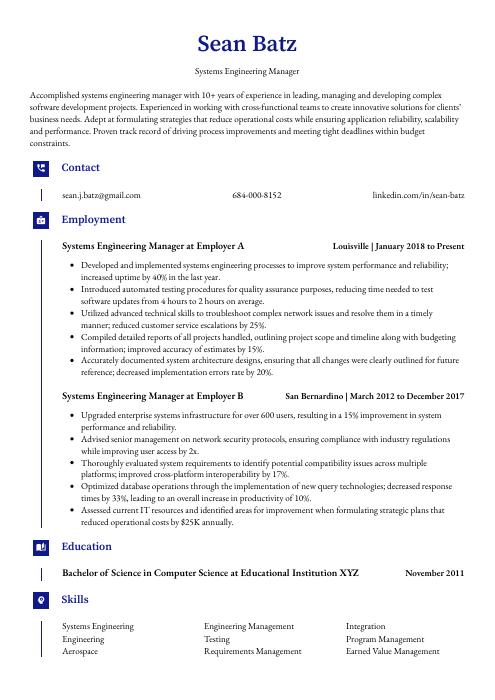 Gharial
Gharial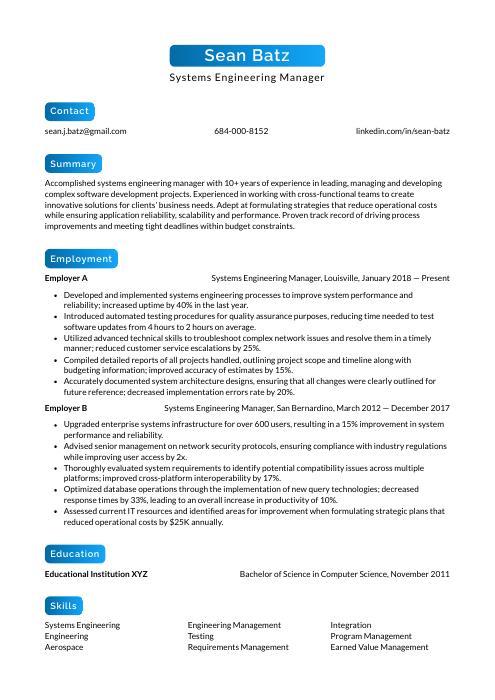 Kinkajou
Kinkajou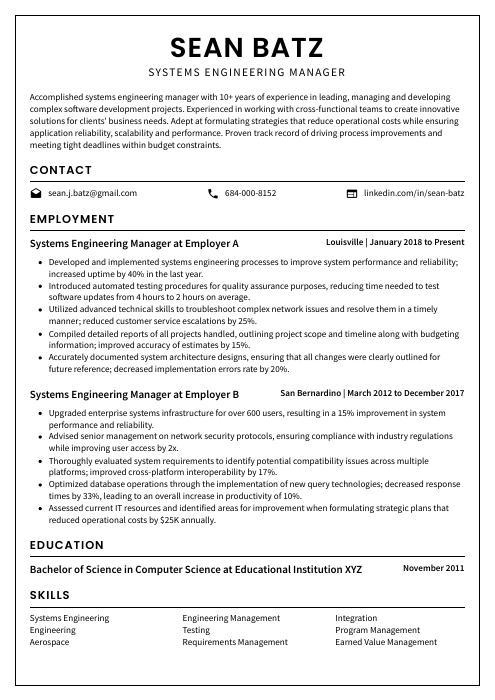 Cormorant
Cormorant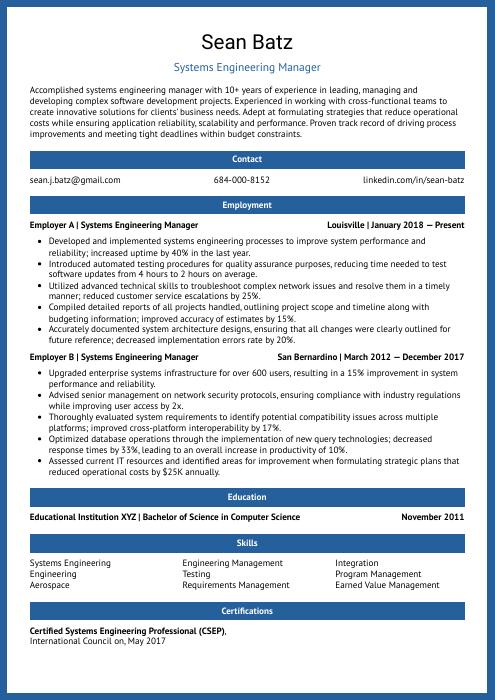 Ocelot
Ocelot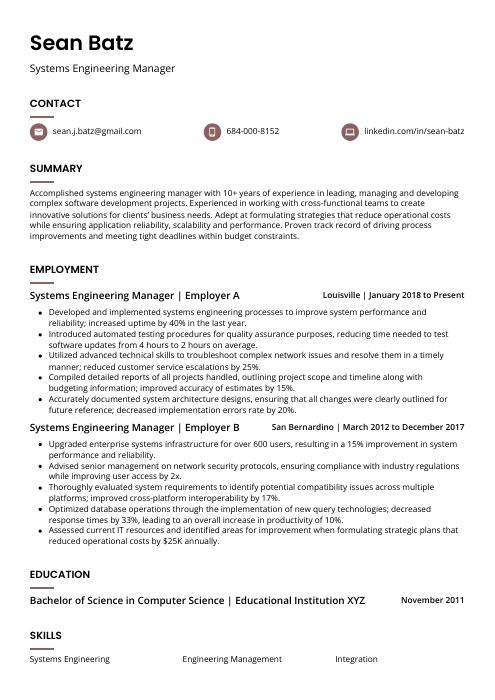 Fossa
Fossa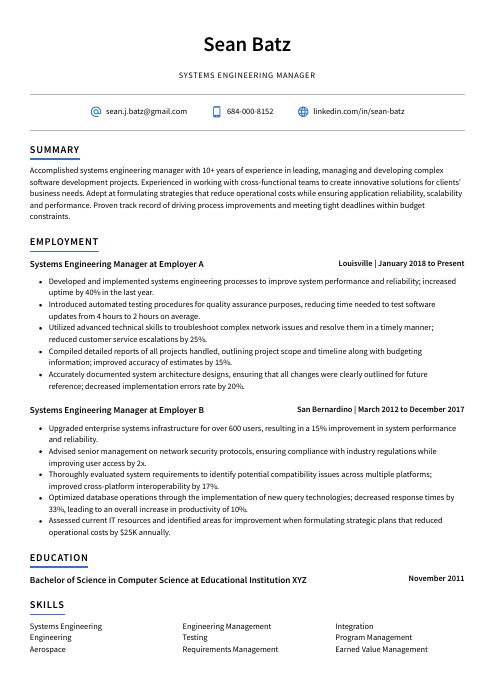 Axolotl
Axolotl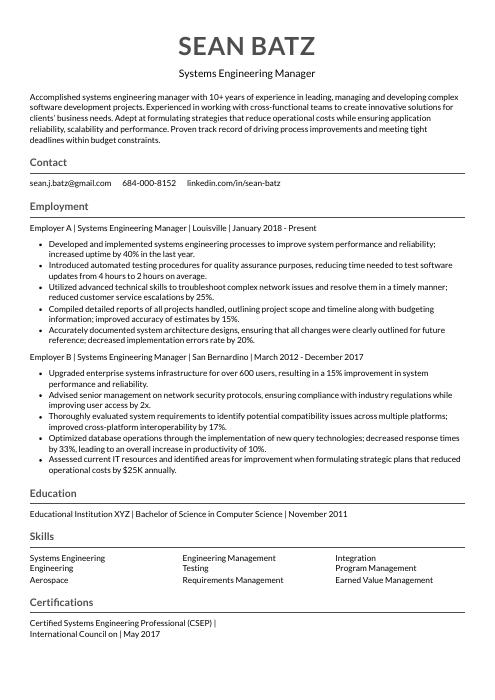 Indri
Indri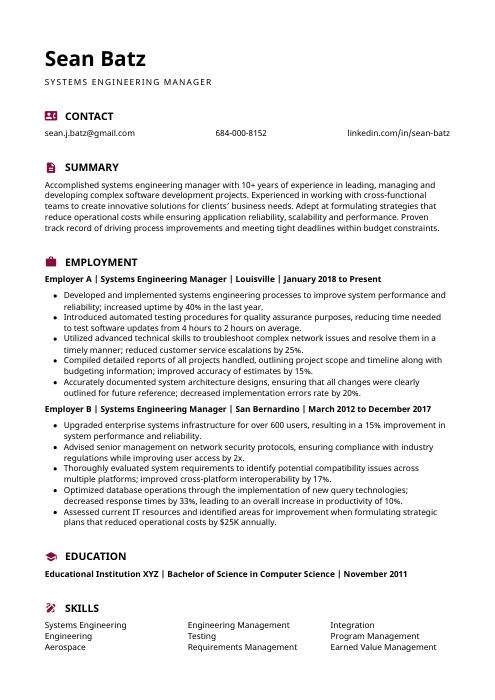 Hoopoe
Hoopoe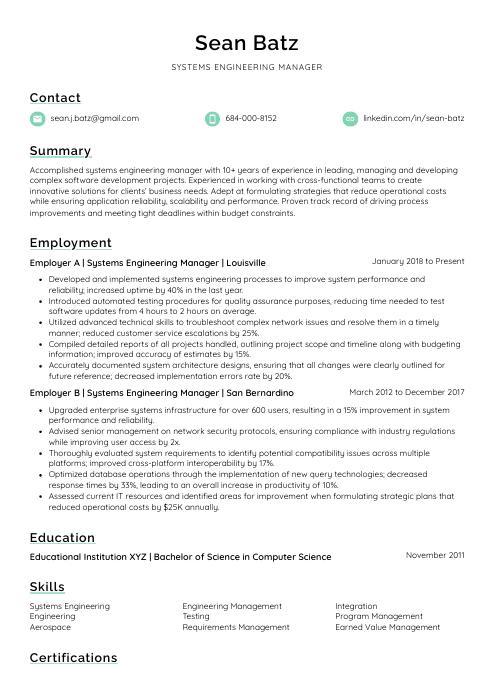 Lorikeet
Lorikeet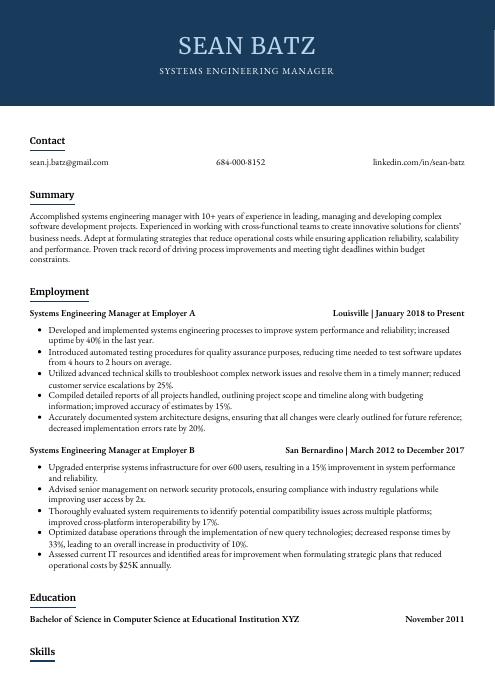 Bonobo
Bonobo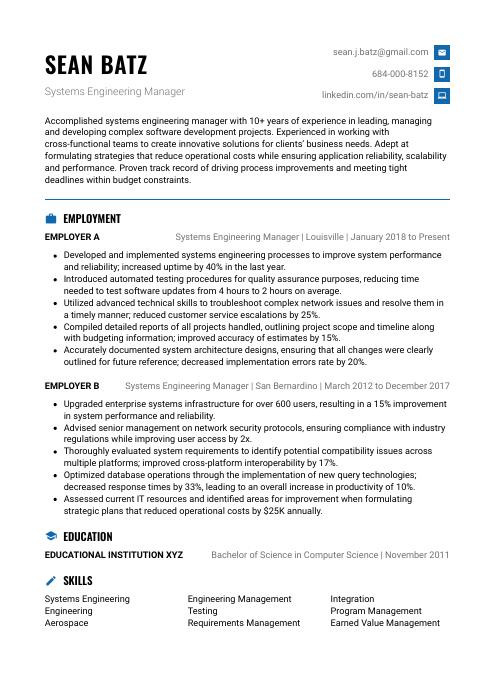 Echidna
Echidna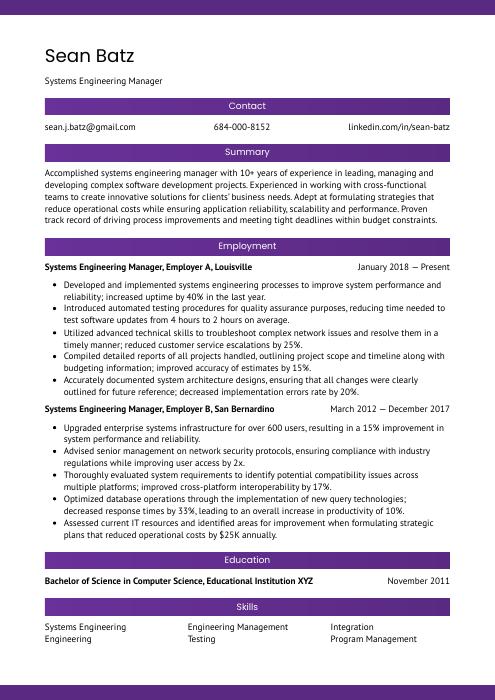 Jerboa
Jerboa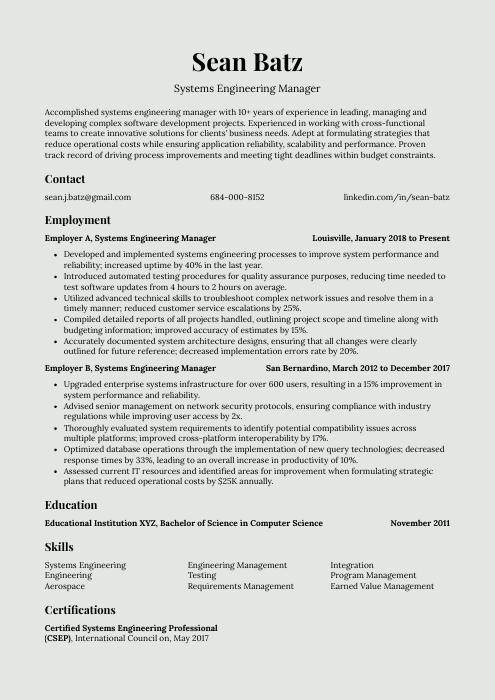 Saola
Saola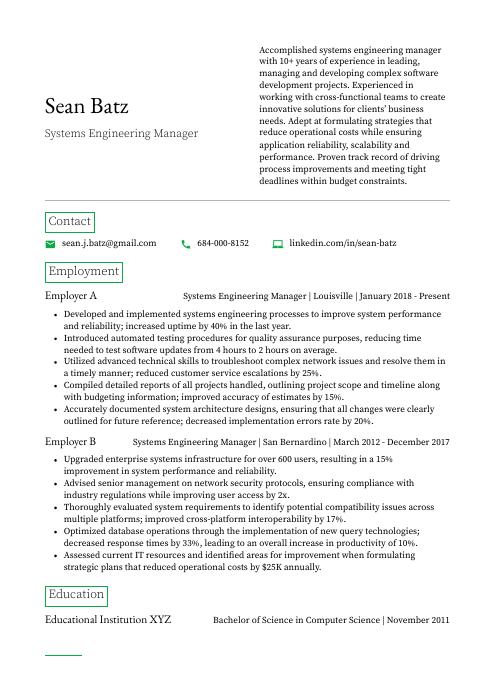 Quokka
Quokka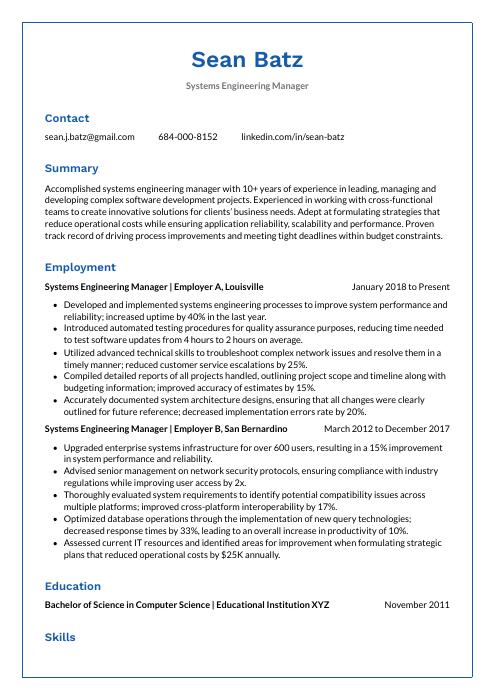 Markhor
Markhor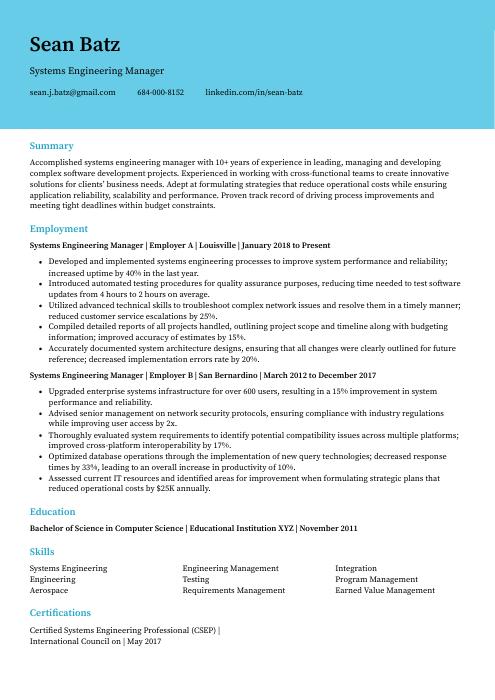 Dugong
Dugong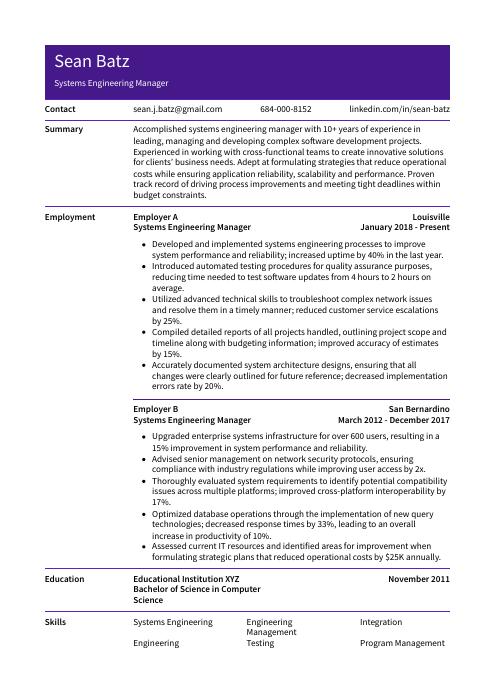 Pika
Pika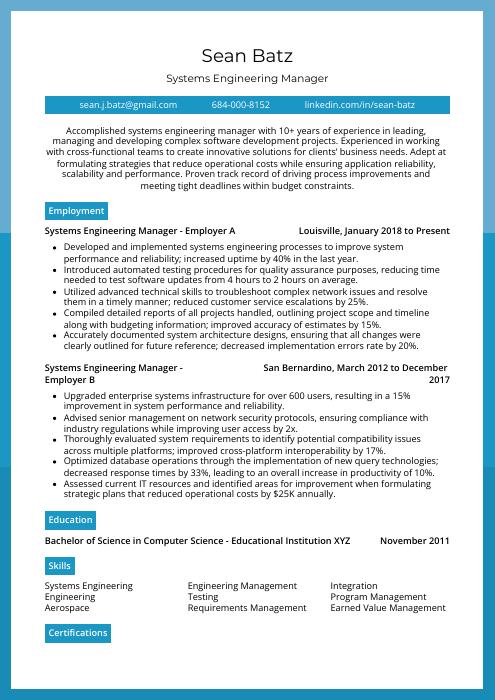 Rhea
Rhea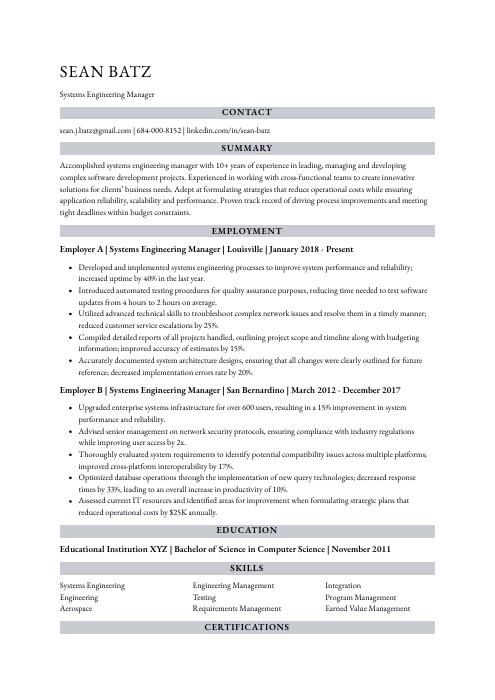 Numbat
Numbat Rezjumei
Rezjumei
